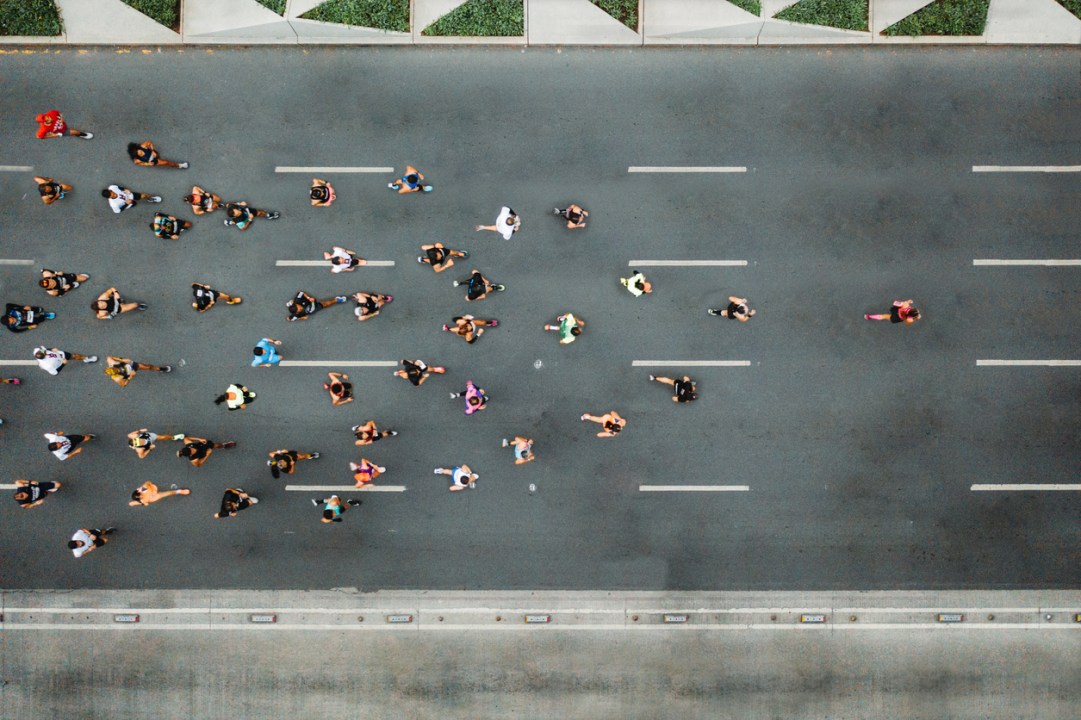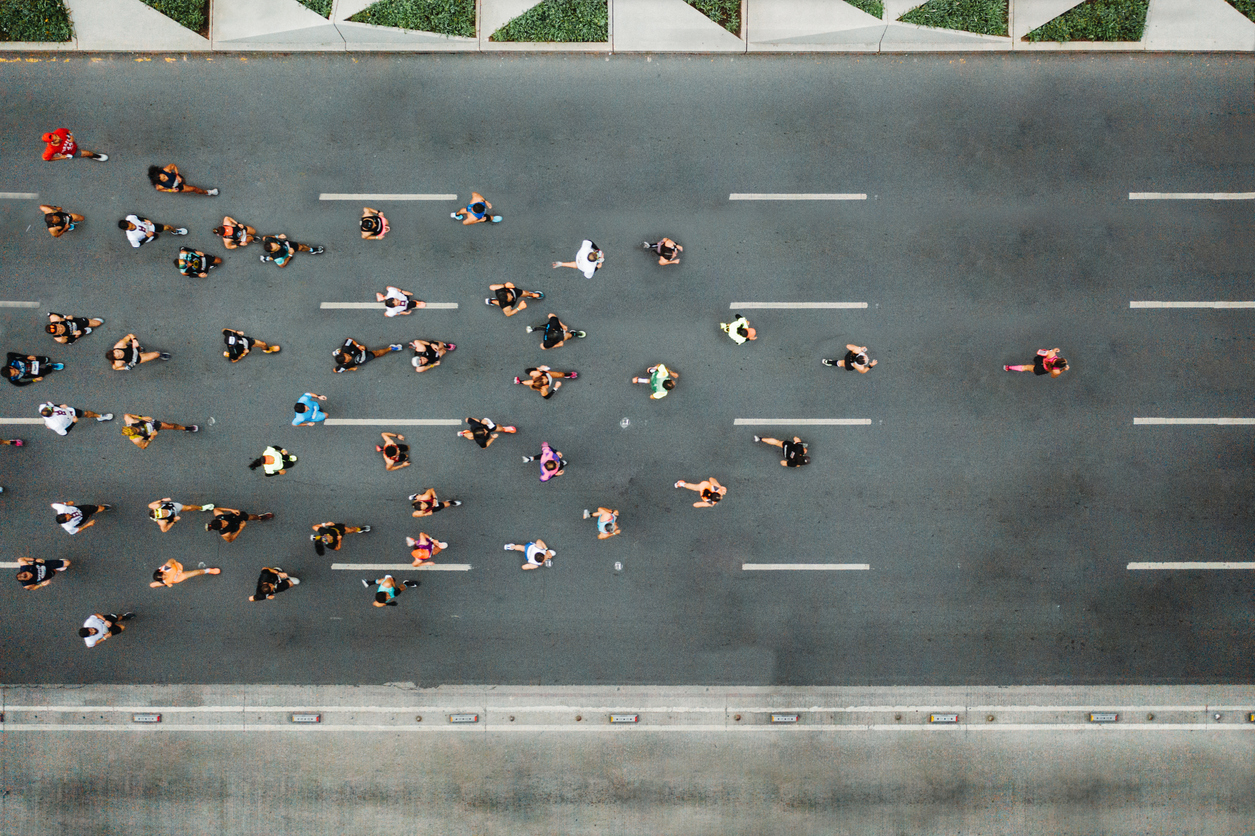Is there a more obnoxious introduction in 21st-century Britain than the words ‘I’m a runner’? ‘I’m a runner,’ followed by the gulp of a protein shake or (shudder) the announcement of a 5k personal best. ‘I’m a runner,’ from a wheezing wannabe in carbon-plated trainers: ‘The shoes Kelvin Kiptum wore when he broke the marathon world record? Yes, yes they are.’
I am no Kelvin Kiptum. I’m not even Simon Pegg in Run Fatboy Run. But I am a runner, with the blackened toenails, tight hamstrings and race medals to prove it. It seems that those things are no longer worth much, though. Just as walking was subsumed by step counts, food by calorie trackers and sleep by eight-hour monitors, running has fallen foul of the bourgeois commodification that veils itself as ‘wellness’. So much for gentrification: these days, we’re seeing the plague of middle-class runnerfication, as swarms of joggers in ludicrously expensive gear and hi-tech gadgets become as common a sight as gastropubs and branches of Gail’s.
Take a stroll (or jog) on any given weekend and you’ll see what I mean. Last year record numbers of Britons took up running, according to Sport England, with 349,000 more regular joggers than in 2023. Much of this, no doubt, was fuelled by Parkrun – the weekly 5k event turned global sensation – which celebrated its 20th anniversary last autumn with a 6,000-plus turnout in Bushy Park, south London.
But you don’t even need to step outside to see the evidence. Look at Instagram, where bright young ‘runfluencers’ such as Mary McCarthy, Jennifer Mannion and Savannah Sachdev have cultivated thousands of followers through their swift (or proudly snail-like) paces and multi-year run streaks. Look at the running apps – a market expected to grow by more than 14 per cent in the next eight years – such as the £1.6 billion route mapper Strava and its recently acquired AI ‘coach’, Runna. Look at the London Marathon website, spangled with the smug announcement that it’s registered a world-record-smashing 1.1 million ballot entries for next year’s race.
Even dating apps have cashed in on the boom, with Tinder launching its own run club last year. And celebrities aren’t immune, with singer Harry Styles the most recent addition to the coveted ‘sub three-hour marathon’ club after completing the Berlin course last month. No wonder the Atlantic called running the ‘new quarter-life crisis’: if you have pre-rheumatic knees and live anywhere near a pavement, the chances are you’ll be pounding it.
‘What’s so wrong with that?’ you may ask as you slurp on your isotonic energy gel. After all, the lure of running is obvious: it’s free (in theory), it’s demonstrably good for your wellbeing and it’s an effective way to shed the pounds. To protect a National Health Service panting beneath the pressure of the obesity crisis and mental ill health, becoming a ‘runner’ is arguably a noble – nay necessary – pursuit.
And yet, of course, it’s not that simple. Long gone are the days when you could pull on a moth-eaten T-shirt and go for a ten-minute pootle round the block. Unless you’re clocking up the kilometres for ‘kudos’ (that’s Strava’s equivalent of social media ‘likes’) with a Garmin watch, hydration vest and £150 heart rate monitor strapped around your chest, it simply doesn’t count. You don’t even have to be running to see this consumerism in action. Nike and US brand Hyperice will launch their ‘hyperboot’ in the UK this month: battery-powered trainers you can pop on for 15 minutes before or after a run to improve blood flow, for the princely sum of £699.99.
At best, running is about dirt on your shoes, strength in your legs and not a thought in your head. At worst, it’s the most grotesque type of consumerist culture
Nowhere is this tedious commodification more obvious than where I live in south-west London – a tarmac idyll for Lululemon-clad athletes. During my last evening loop around Battersea Park, I counted no fewer than 28 fellow runners clogging up the pathways. So ubiquitous are the pavement patrols that even a friend of mine, who once missed a flight to Buenos Aires because he refused to run for it, caved into the pressure and signed up for the Barcelona Marathon. When building up to 26.2 miles from no miles at all, little wonder that he (like many) ended up with shin splints, dodgy ankles and a torn ACL. (By the way, for the purposes of this piece, he’s still asked I call him a ‘runner’.)
Just last week I saw three posts from a runfluencer on the verge of despair because he’d completed ‘the worst half-marathon of his life’ in – horror of horrors – one hour, 23 minutes. This, to be clear, is not an elite athlete; just an ordinary man with a few dozen brain cells and copious time to train. His is hardly the plight of Pheidippides, the legendary marathoner who ran to Athens to announce the Ancient Greeks’ victory in battle and promptly died from the effort. But, then again, even Pheidippides might have pulled through for a Puma sponsorship deal and some high-protein ready meals to flog.
This isn’t the first running boom in the past 50 years. Nor will it be the last. And yet it’s notable that this latest explosion comes hot on the heels of the Covid years, when once-daily exercise was one of the only legal reasons to leave the house and ‘staying healthy’ took on a more sinister significance. Against that backdrop, the posturing of ‘runners’ – the obsession with pace and over-priced gear and carbohydrate consumption – is almost gratuitous. At best, running is about the freedom of dirt on your shoes, strength in your legs and not a thought in your head. At worst, it’s a dangerous cycle of control and comparison, the most grotesque type of consumerist culture in which food becomes fuel, bodies become gym equipment and personal bests become just another number to beat.
Perhaps the best runner to look to, then, is the great Japanese novelist Haruki Murakami, who has been running every day since 1982. While promoting his 188-page ode to the sport, What I Talk About When I Talk About Running, he wrote simply: ‘I’m not a great runner, but I’m a strong runner. That’s one of the very few gifts I can be proud of.’ Is there a more humble, more worthy way of explaining why you run? Not for style, speed or to log on social media, but simply because you can?
So much for ‘I’m a runner’. Ask yourself: why, exactly, are you?








Comments